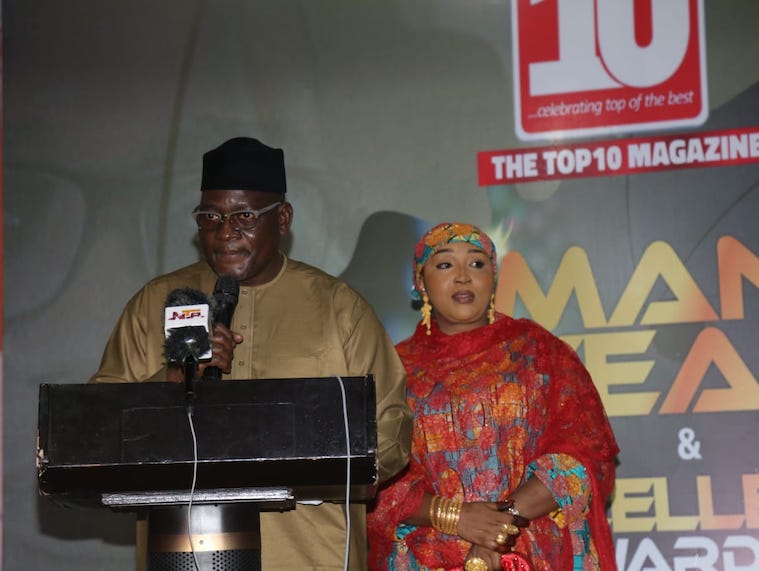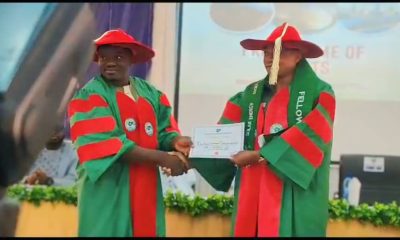Media
Need for Nigerians to Shun Fake News

By Oko Pascal Adinya
The rapid growth of technology, coupled with the ever-expanding realm of information technology and social media, poses a pressing threat to our society and nation. The dissemination of false information possesses the potential to disrupt the delicate fabric of our society and indeed, the entire country.
No doubt, the proliferation of numerous social media platforms such as Twitter, Facebook, Instagram, WhatsApp, TikTok and others has made it effortless for malicious actors to circulate fake news at lightning speed. Regrettably, people often neglect to scrutinize the authenticity of the information they share. Nigeria’s rich tapestry of ethnic diversity makes it particularly susceptible to the divisive nature of fake news.Fabricated stories pitting one tribe against another or one political party against its rival can sow discord and even incite violence. Indisputably, the creation and dissemination of fake news has a sinister motive. Its purpose is to deceive, breed mistrust, undermine democratic processes, propagate debunked scientific claims, obscure the truth and incite violence. The spread of fake news has provided a breeding ground for hate speech and unpleasant conspiracy theories, deliberately crafted to foster discontent. Even politicians engage in this practice to tarnish their opponents or discredit opposing parties, sometimes resorting to maligning entire ethnic groups.
Fake News also has damaging effects on critical sectors. For instance, the impact of fake news on medical science is painfully apparent. It impedes people from making informed decisions and enhancing their quality of life. Spurious stories that present immunization, as a covert birth control method has the capacity to dissuade many from participation, thus exposing them to preventable diseases. Additionally, Fake news exerts a detrimental influence on investment decisions. The promotion of dubious brands can lead individuals to overspend or fall victim to scams propagated by false information. Sadly, many have suffered financial losses due to such deceitful practices.Even governments and their well-intentioned projects and programmes do not escape the clutches of fake news. Its effects make it challenging for citizens to perceive the truth and appreciate government’s efforts to uplift their lives. The proliferation of fake news has caused numerous communities to oppose government initiatives that would otherwise benefit them.
Likewise, Fake news has the potential to foment disharmony and violence within a society. False narratives, whether online or physical, aimed at specific groups can instil fear or subject individuals to harassment. Most times, the media is complicit in the deliberate spread of false information for ulterior motives. Activities of individuals like Jackson Ude, accused severally for their penchant for spreading fake news have dire consequences for the country. Recently, Ude tweeted a damaging falsehood alleging that judges from the Presidential Election Petition Tribunal (PEPT) were drafting their judgments in the residence of the former Minister of Works, Babatunde Fashola. This allegation caused public outrage as it was capable of plunging the country into crisis had it not been exposed as false.
Another instance of the harmful effects of fake news is the false claim by MyNigeria, a media outlet based outside the country alleging that the recent hike in fuel prices resulted from extortion by some security forces. Such misleading narratives not only creates public unrest but also erode trust in government institutions. Furthermore, unethical journalism practices, characterized by inciting and sensational reporting by the likes of Samuel Ogundipe’s People’s Gazette and Omoyele Sowore’s Sahara Reporters pose grave concerns. These individuals seem to have abandoned the fundamental principles of ethical journalism and opted, instead to perpetuate sensationalism and discord.
The impact of these actions is profound. They foster a climate of misinformation and distrust in the media, undermine public confidence in crucial institutions and can even incite unnecessary social and political turmoil. In an era where the media is meant to be a reliable source of information and accountability, such compromise of ethical standards can have far-reaching consequences for the country as a whole. t is even unfortunate that these individuals live outside the country, yet continue to churn out Fake News to destabilise their home country. By abusing jurisdictional boundaries, they continue to pursue divisive actions.
Unfortunately, these persons are ignorant of the fact that their relatives still reside in the country, thus when the country burns, it would also consume them. A popular adage says do not throw a stone in the market place because you do not know on whose head it will land. Persons and groups that spread Fake News because it serves their temporary interest should take a moment to consider the real-world consequences of their actions. They should understand that disseminating fake news is harmful. Our society and our country can only thrive when we minimize and actively discourage the spread of fake news, if not eradicate it altogether.
Oko Pascal Adinya is a Legal Practitioner and Public Affairs Commentator writing from Makurdi, Benue State
Media
Nami, Ex-FIRS Chairman Receives Top10 Magazine ‘Man of the Year 2023’ Award

Health
ICRC Trains 25 Journalists on First Aid Treatment in Yola

From Yagana Ali, Yola.
The International Committee of the Red Cross(ICRC) has organized a three -day training for 25 journalists on effective First Aid Treatment to prospective casualties.
The workshop, which took place in Yola drew the beneficiaries from different media houses across the state.
In a presentation, Communication Field Officer of the organization, Lemdi Edmond took the participants memory lane from its cradle to limelight.
He pointed out that ICRC intervenes basically in crises involving armed conflicts translating to man -made or unnatural disasters.
Edmond further explained that while the International Federation of the Red Cross intervenes in the area of natural disasters, like flood and earthquake, the National Red Cross Societies handles both natural and man – made situations.
The Communication Field Officer identified seven principles of the Committee to include humanity, impartiality,Neutrality and independence among others.
On their parts, First Aid and Pre-hospital Care Field Office Yola and Abuja respectively, Charity Maxwell and Daniel Ebodor jointly exposed the participants to the meaning, relevance and significance of the First Aid.
They maintained that First Aids basically aimed to save life, prevent condition from further deteriorating and promote speedy recovery.
They identified truthfulness, sympathy, resourcefulness, tolerance and empathy among others as qualities of a good First Aider.
The duo also enumerated and extensively explained Primary Survey variables relating to First Aid as Danger, Response, Airway, Breathing and chest compression.
Interestingly, the participants were vigorously engaged in practical First Aid treatment on various aspects having to do with Burns, Fainting, Fracture and bleeding among others.
Highlights of the training were questions and answers, presentation of certificate and First Aid Kits to the participants
COVER
Newspaper Proprietors Decry Harsh Economy, Seek FG Bailout

By David Torough, Abuja
The Newspaper Proprietors Association of Nigeria (NPAN), on Thursday, urged the Federal Government to support the print media to prevent it from going extinct.
Members of NPAN said this in Abuja, during a Business Lunch for some of their colleagues who were recently appointed as ministers.
Four members of the association were recently appointed as ministers by President Bola Tinubu.
They include Wale Edun, Minister of Finance and Coordinating Economy; Mr Dele Alake, Minister of Solid Minerals Development; Alhaji Mohammed Idris Malagi, Minister of Information and National Orientation, and Hannatu Musawa, Minister of Art, Culture and Creative Economy.
The President of NPAN, Malam Kabir Yusuf, said that the media deserved to be supported because it played an integral role in national development.
Yusuf commended Tinubu for finding so many members of the association worthy to be appointed as ministers.
The publisher of Vanguard Newspapers, and life patron of NPAN, Mr Sam Amuka, said that it was commendable to have four of his colleagues as ministers.
He advised the ministers to represent the association well, urging them to use their influence in government to ensure a free press.
“Let the Newspapers Breathe,” he told the Ministers as he emphasised the need for Federal government intervention to save the Newspaper industry from imminent collapse.
“The Newspapers are losing revenues everyday,” Amuka stated.
In his response, the Finance Minister, Wale Edun, assured the association that Tinubu’s economic reforms would be beneficial to all individuals and groups within the country.
Edun urged members of NPAN to support the government by being factual and objective in their reportage.
Minister of Solid Minerals Development, Dele Alake, who described himself as an NPAN ambassador in government, urged journalists to be analytical and to always resist the temptation to peddle falsehood.
“Do not join the crowd to peddle falsehood, ” he said.
The Minister of Information and National Orientation, Mohammed Idris, described himself as the luckiest information minister in history.
Malagi said that his plan was to change the face of government communication.
“Trust in the communication coming out of government will be encouraged.
“I will not tell lies; I will say it the way it is. You people should also report it the way it is, ” he said.
He said that the government would also take steps to restore the integrity of public broadcasting by equipping and empowering government-owned broadcast houses.
Also present at the business lunch was veteran journalist and former governor of Ogun State, Chief Segun Osoba, as well as prominent senior Nigerian journalists, proprietors, President of the Nigerian Union of Journalists (NUJ) and that of Nigerian Guild of Editors (NGE), Eze Anaba( additional reports from NAN)




















